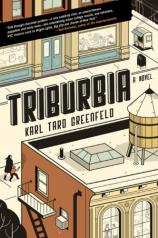Triburbia
Review
Triburbia
A recent New Yorker cover illustrates a woman, pushing her preschool child in a stroller and arriving at a playground. Every bench, climbing structure and sandbox is occupied not by moms and nannies, but by dads caring for their young children. That might not be the precise mood evoked by Karl Taro Greenfeld's TRIBURBIA, but it’s among the issues touched on in his examination of the segment of New York's population living in the exclusive --- and constantly evolving --- TriBeCa neighborhood.
"[T]he book's pleasure derives not from a single arching narrative but rather through a series of these surprising interconnections, as Greenfeld circles back time and again to look at a character or a situation from a different vantage point."
The dads in Greenfeld's book might not be the nurturing types exactly, but they have the time and flexibility to do things like drop their kids off at school and kibbutz over coffee at the local coffee shop afterwards --- things that so-called housewives did in earlier times. They are "creative types": a sculptor, a photographer, and a playwright among them, the kind of people for whom TriBeCa's artistic reputation still holds a certain bohemian cachet, despite its current astronomical real estate prices.
One of their wives reflects at one point on the type of man to be found in this neighborhood: "You have these hybrids," she notes. "I don't know what guys do anymore, but it seems like when I meet a man in his twenties or thirties, he does something in advertising or marketing, but is more defined by his hobby of riding fixed-gear bicycles or some intense and very particular food enthusiasm." Pretentious, perhaps, but also tasteful in the best possible way, either successful in spite of themselves (as in the case of Mark, a prosperous sound engineer who not-so-secretly longs to be a musician) or dependent on their more traditionally employed wives to pay their kids' music school tuition and Little League dues, not to mention the mortgages on their seven-figure condos.
Whether to call Greenfeld's book a novel or a collection of short stories is a bit of a conundrum. Certainly the reader develops an ever-expanding understanding of this group of men and their interactions --- the kinds of petty jealousies and reluctant friendships that arise out of any sort of insular community. But the book's pleasure derives not from a single arching narrative but rather through a series of these surprising interconnections, as Greenfeld circles back time and again to look at a character or a situation from a different vantage point. As he does so, he profiles not only a certain type of New Yorker but also --- especially given that the chapter titles are named for their subject's street address --- a community itself, warts and all.
Tom Perrotta's LITTLE CHILDREN has been widely lauded for satirizing suburban partisanship and hypocrisy. TRIBURBIA does much the same thing, but in a way that shows that residents of the big city, despite their surface sophistication, are just as susceptible to corruption, temptation and small-minded concerns.
Reviewed by Norah Piehl on August 2, 2012
Triburbia
- Publication Date: July 16, 2013
- Genres: Fiction
- Paperback: 272 pages
- Publisher: Harper Perennial
- ISBN-10: 0062132407
- ISBN-13: 9780062132406





